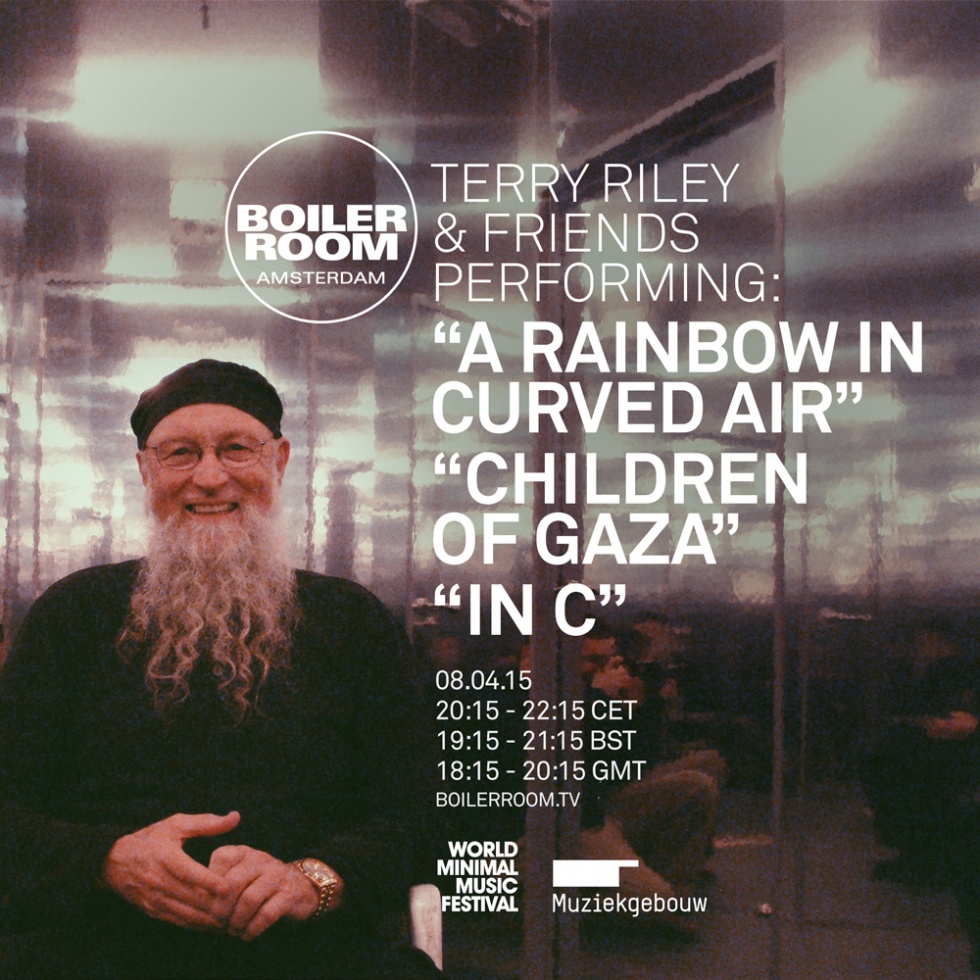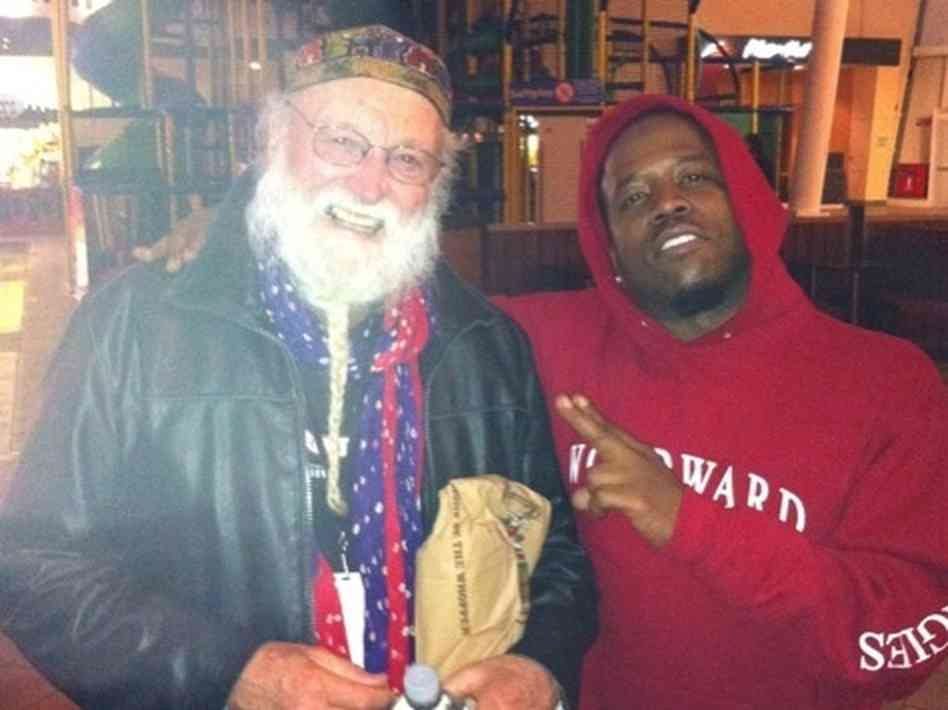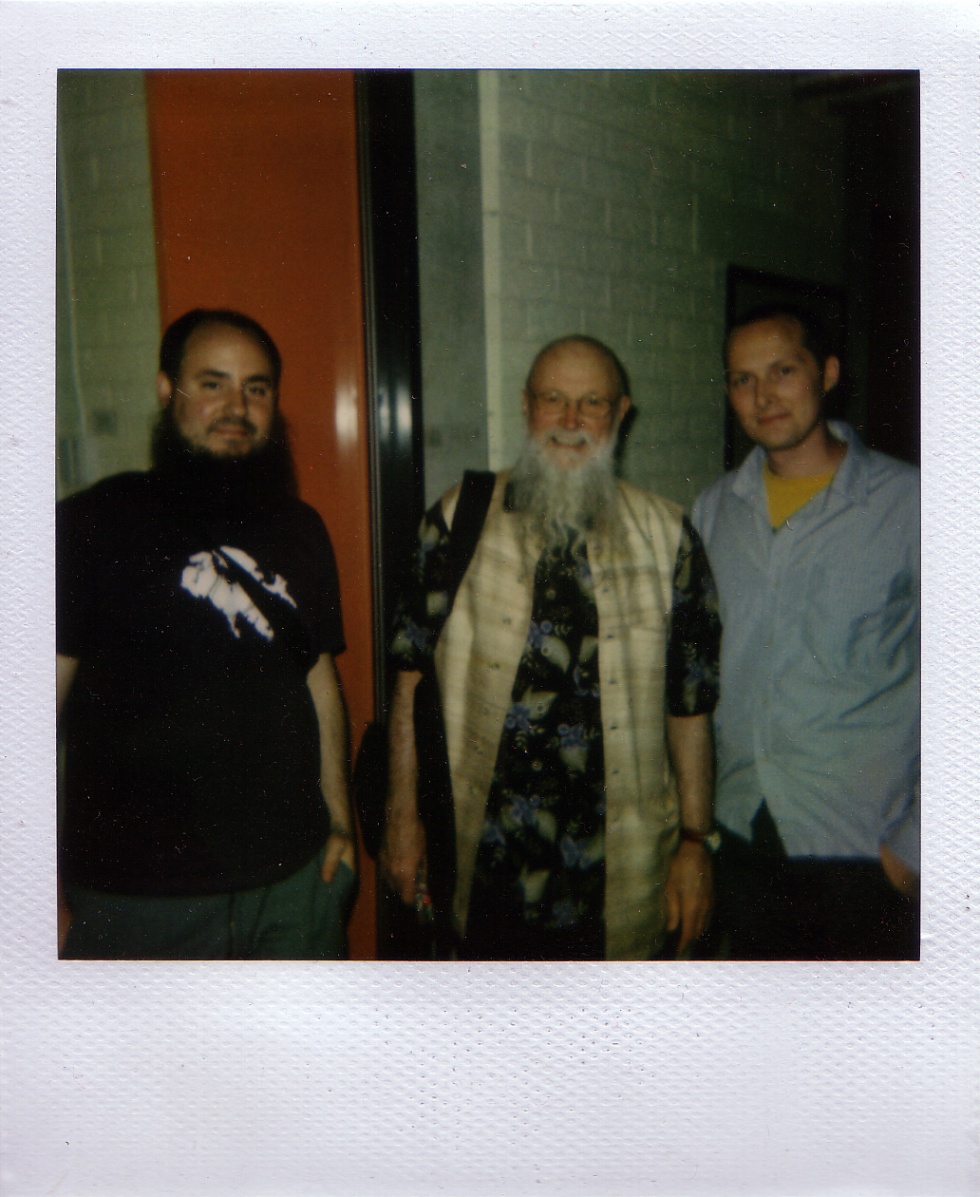
How appropriate that a composer and performer whose work is shot through with cosmic love vibrations should stimulate a total love-fest. We’d been a bit concerned the canvassing opinions on Terry Riley might get people nerding out, getting a bit dry and academic – but no. Just like us in the office when we found out we’d be broadcasting a Riley show from Amsterdam, everyone we asked was frankly a bit overcome with enthusiasm.
From techno heroes to folktronicists, ambient explorers to sampladelic pranksters, everyone we asked had a deep, deep appreciation of Riley’s music, and a sense that he gives just a little bit more than the average composer to his listeners. From a medical recommendation to a sartorial one, from a sense of “maximal heart” to one of “breathtaking elegance”, the range and depth of the love is palpable. And please, please read right to the end, if only to see what is without question the greatest photograph the Boiler Room has ever published.
JD Twitch (Optimo)
“Terry Riley was probably the first trance music I ever knowingly heard, and certainly the first I loved, as A Rainbow In Curved Air was a teenage stoner listening session favourite amongst my group of ne’er-do-well friends. We discovered him as we were massively into Daevid Allen who cited him as his ‘loop guru,’ which, while mystifying to us, was too intriguing not to explore. Then in the early 90s A Rainbow In Curved Air resurfaced in lots of ambient sets and I started to delve deeper into his catalogue which I swear has healing properties. Try it. Next time you feel under the weather, listen to a few hours of Terry Riley and I bet you will feel at the very least a bit better.”
“One of the founding fathers of modern music, as important as Chuck Berry is to rockers”
Mixmaster Morris (Ambient kingpin)
“He’s one of the great innovators – in fact, one of the founding fathers of modern music, as important to people who like their music long and immersive as Chuck Berry is to rockers. With “You’re no Good” he invented the remix… in 1968! Poppy Nogood, Eastern Man, A Rainbow in Curved Air, Shri Camel, Les Yeux Fermes and this have all featured in my sets, and he was a definite and deliberate influence on Irresistible Force records, especially Global Chillage. I was also hugely inspired by reading about his all-night electronic shows in university dorms, it gave me a very clear vision of what I wanted to do myself.”
Ariel Kalma (Unsung hero of New Age / jazz / minimalism fusions, recently signed with RVNG Intl.)
“Terry Riley’s continuing influence is down to the fact that he can marry technology and inspiration into a palatable piece of music, and because he can induce a sense of timelessness. He showed me what is possible at a time when I was searching for ways to do something with the music I felt inside of me. He just played alone on stage with his modified keyboard: it was fascinating for me, and gave me the idea that I too could do the same. So I bought and modified an electronic keyboard and started playing in public… In doing that, I learned from him that we should all follow our dream! My fondest moment with Terry is when I was backstage looking at him on stage playing and sometimes turning to me with a discreet smile on his face… a priceless moment.”
Honey Owens (Valet)
“Terry Riley is one of those guys that you keep on going back to for inspiration..the gift that keeps on giving. When I first heard A Rainbow in Curved Air it blew my mind. It was the soundtrack to my life that I had always been looking for, you know? I must’ve listened to it a 100 times. I’ve seen him a few times now, usually at these cutty little Unity centers where all the local heads kick it. They look like the quintessential Summer of Love hippies that still have that blissed out, I-flew-close-to-the-sun looks on their faces, smiling away at everyone as we walk in quietly and choose a beat-up cushion to sit on a Sunday at 11am sharp haha. It’s so rad: just a little Sunday morning trip sesh with Terry and whoever he has chosen to jam with that day.
“As I peruse the scene I realize that Will Ferrell was on Tabla!”
“One time we saw him at night at this student union courtyard where they had wine and it was sponsored by Shambala magazine or something. I don’t really smoke pot that often but I was with a crew who were hot boxing in their car so I was like okay whatever. We get in the place as everyone was warming up and starting to jam and as I peruse the scene I realize that Will Ferrell was on Tabla! Seriously it looked so much like Will Ferrell I mean, as far as we were concerned it was him you know. My head exploded and I started to laugh so hard hysterically that I had to leave, practically carried out of there… I felt bummed to miss the show on one hand but on another I felt like Terry brought me face to face with the great illusion, Maya haha… Anyway, I’m also grateful for Terry because he turned me on to Pandit Pran Nath who basically nanny’d our baby to sleep every night.”
Ben Chatwin (The Scottish-based ambient folktronicist formerly known as Talvihorros)
“Hearing Terry Riley’s music for the first time was a complete revelation for me: although strongly conceptual he seems to immediately free himself from any of the stuffy academia for something that feels loose and free, endlessly evolving into these epic otherworldly soundscapes. His influence over modern electronic music is huge – something like A Rainbow in Curved Air could be put out today and no one would guess it was recorded in 1968, which is an incredible feat given how quickly electronic music dates. True future music.”
Lawrence English (Australian resident composer and ambient maestro)
“Terry Riley remains one of the single most influential and resonate musical forces of the 20th century. His minimal incantations echo over time, harmonising with emergent movements in future generations. He has managed to open a very unique portal into sound and harmony, the likes of which can’t be easily quantified!
“A few years back I had the pleasure to share an improvisation with Terry and Keith Fullerton Whitman (see picture above, English on the right). Keith and I were both struck by his genuine warmth and openness. He creates a musical vista that profoundly affects all who fall within in. To play with him was one of those true pleasures, his abilities to shape sound is truly breathtaking in its elegance.”
“The fact that it was from 1969 was both incredibly humbling and invigorating”
Cristian Vogel (Chilean-German-British techno overlord in Copenhagen)
“In terms of minimalism I suppose I was more influenced by La Monte Young at first, as I came across the Dream House idea in my twenties. But over the years it has been Terry Riley’s output which has appeared most throughout my life in music like a nourishing oasis of calm connectedness.”
Cecile Schott (Colleen)
“Around 1998, I bought a copy of David Toop’s Ocean of Sound compilation. It featured two tracks that really captured my attention: one was by Can’s Holger Czukay, which featured what could be called proto-sampling, and the other was an excerpt from Terry Riley’s Poppy Nogood. At the time I was still primarily a guitar-player who had dabbled in experimentation on a 4-track recorder, but I could not seem to find the new musical path I was desperately seeking, and I can definitely say that hearing Poppy Nogood was one of those moments when you not only hear something which blows you away, but instantly recognize that it’s something which can be relevant to your own quest.
“The fact that it was from 1969 was both incredibly humbling and invigorating, and everything in it seemed to point the way towards what I felt like doing: repetitive but always evolving, minimal yet dense, based on acoustic sounds but submitting them to intense sound treatment, it sounded like it had been beamed from another planet or time. In my first ever mix in May 2003 just after the release of my first album Everyone Alive Wants Answers, the second piece of music I chose was… Poppy Nogood.”
Thomas Fehlmann (The Orb / Kompakt)
“Well, I got A Rainbow in Curved Air in ’74 when I was 15, and he struck me very much as a singular composer. I was very familiar with the kraut electronics of that time but he seemed to have another quality, a spiritual level. Now, funnily enough, that wasn’t actually something I was very attracted by in those days but it seemed to give the music more depth and a particular glow I soaked up. It didn’t have anything to do with drugs, but I enjoyed the atmosphere it was setting up in a space. It was charged with purpose.
“Terry Riley opened doors for me. Shortly after I heard La Monte Young and Steve Reich for the first time, and by then I new i needed a whole new compartment in my record shelf for those LPs.”
“Let yourself happen. Find a place you like and stay for a while. Wear better hats.”
David Moore (Bing & Ruth)
“The man is deeply incredible, and deeply incredible people tend to also be quite influential. There is such an intense joy and playfulness to his music. I can lay back and forget it’s on and just let it happen to me. For me personally, he helped refine the concept of both improvisation and drone – helped me understand that there were different ways to approach these things. An improvisation doesn’t have to be a solo. A drone does not have to be a static sound. There is a rebellion in his work that draws me in. When I was young someone played me A Rainbow in Curved Air and I’d never heard anything like it before. This was a time in my life where that sort of thing was not happening very often, so it had a fairly massive impact. I still listen to it regularly. What does Terry teach us? Let yourself happen. Find a place you like and stay for a while. Wear better hats.”
Drew Daniel (Matmos / Soft Pink Truth)
“Terry Riley’s music is a deep wellspring of inspiration and has quietly but powerfully informed a vast range of practices, approaches and forms across electronic and experimental music. From the intuitive sprawl of Music For the Gift to the communal exstasis of In C to the langourous melodic reach of Salome Dances for Peace to the FM synthesis idiosyncrasy of Sri Camel to the endless hall of mirrors that is his work with the Time-Lag Accumulator, you can hear the DNA of Riley’s approach across the spectrum of contemporary music. “Minimal” is inadequate to describe the maximal heart and force of his music, which has inspired Matmos for years. We were incredibly honored to work with Terry, to play his music in an ensemble with him in Rome and Los Angeles, and to collaborate on music at his home in California. He is, in person, a gentle, patient, humorous magus. Praise Terry!”
Gregor Schwellenbach (Kompakt)
“My name is Gregor Schwellenbach, I am a composer and producer. I release music on Kompakt and I have a background in classical education and academic training as a composer, arranger and instrumentalist. In July I will perform Terry Rileys Keyboard Study #1 in a one hour version in Cologne.
“I am pretty much obsessed with tracing back traditions, I always want to find out what was before and who got the idea first. Terry Riley is an absolute key figure for electronic dance music, since he was the first to base music on the principle of looping. You even can call him the inventor of actual tape loop machines. That puts him on a level as elementary as Robert Moog’s invention of the synthesizer. There is this great recording from some french radio, one of Riley’s very first public works. Actually he is performing with the Chet Baker Trio, and he is using tape loops to extend or respectively disrupt the Jazz improvisations. I guess that might be the first usage of tape loops in music history.
“The simplicity of Riley’s music doesn’t feel cheap.”
“For us who are grown up with pop music and the electronic club music culture, the approach of the american minimal composers from the sixties sounds very familiar. It’s music we imediately understand, because it’s based on the principle of steady pulses and repetitive loops often but not necessarily in a simple modal tonality. The effect of this music is a hypnotic state, very different from other academic composed music that is often based on complexity and constant development. The simplicity of Riley’s music doesn’t feel cheap.
“Finally like a lot of stars from the sixties he kept on working and developing his styles until today. It’s rewarding to dig into his later works. Riley delivered his own version of many musical styles, and his openness is amazing. From his core topic “Indian inspired keyboard improvisations” to even classical guitar tunes that remind of spanish composers from the 19th century (The Book of Abbeyozzud). But for me my favourite thread is his connection with pop music, starting with A Rainbow in Curved Air and Church of Anthrax. One of my favourite tracks is “You’re no Good”. Framed by early synthesizer-experiments as intro and ending it’s basically an edit of the eponymous song by The Harvey Averne Dozen, using two tape-loops. Basically that’s a proto-disco-edit. That’s my Terry Riley club tune!”
Gabriel Szatan (Boiler Room’s Deputy Editor)
“I’ll swerve an outpouring of praise, in favour of something more glorious and somewhat surreal than even Terry’s music: coming across the man enjoying a 3am Burger King opposite an adventure playground at Butlins alongside Big Boi, who had earlier bridged the gap on the main stage between Riley and Lee Scratch Perry. Bizarro.”

– Terry Riley performs Boiler Room next Wednesday (8th) April alongside some special guests. More info HERE –
